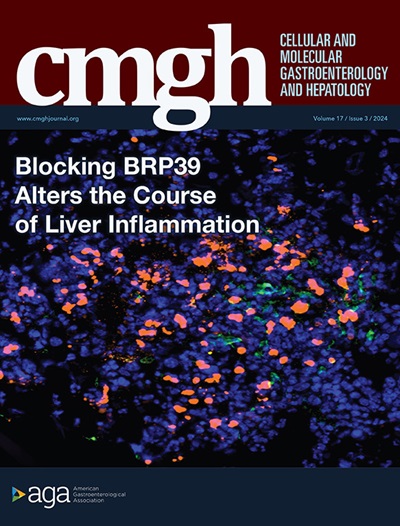肝脏再生的品系重编程策略的进展与前景。
IF 7.1
1区 医学
Q1 GASTROENTEROLOGY & HEPATOLOGY
Cellular and Molecular Gastroenterology and Hepatology
Pub Date : 2024-01-01
DOI:10.1016/j.jcmgh.2024.101395
引用次数: 0
摘要
肝脏具有非凡的再生能力。然而,原代人类肝细胞的体外增殖能力有限,再加上体内病理条件导致的再生能力受损,这对肝损伤和疾病后肝脏的有效再生构成了重大障碍。制定弥补内源性肝细胞损失的策略对于克服这些挑战至关重要,而这仍然是一个活跃的研究领域。系谱重编程是绕过中间多能状态将一种细胞类型直接转化为另一种细胞类型的过程,它已成为再生医学中生成用于治疗目的的特定细胞类型的一种有前途的方法。在此,我们将讨论肝细胞系谱重编程的最新进展和新兴技术,及其在促进肝脏再生或治疗肝病模型中的潜在应用。我们还讨论了这一领域面临的争议和挑战。本文章由计算机程序翻译,如有差异,请以英文原文为准。
The Progress and Promise of Lineage Reprogramming Strategies for Liver Regeneration
The liver exhibits remarkable regenerative capacity. However, the limited ability of primary human hepatocytes to proliferate in vitro, combined with a compromised regenerative capacity induced by pathological conditions in vivo, presents significant obstacles to effective liver regeneration following liver injuries and diseases. Developing strategies to compensate for the loss of endogenous hepatocytes is crucial for overcoming these challenges, and this remains an active area of investigation. Lineage reprogramming, the process of directly converting one cell type into another bypassing the intermediate pluripotent state, has emerged as a promising method for generating specific cell types for therapeutic purposes in regenerative medicine. Here, we discuss the recent progress and emergent technologies in lineage reprogramming into hepatic cells, and their potential applications in enhancing liver regeneration or treating liver disease models. We also address controversies and challenges that confront this field.
求助全文
通过发布文献求助,成功后即可免费获取论文全文。
去求助
来源期刊

Cellular and Molecular Gastroenterology and Hepatology
Medicine-Gastroenterology
CiteScore
13.00
自引率
2.80%
发文量
246
审稿时长
42 days
期刊介绍:
"Cell and Molecular Gastroenterology and Hepatology (CMGH)" is a journal dedicated to advancing the understanding of digestive biology through impactful research that spans the spectrum of normal gastrointestinal, hepatic, and pancreatic functions, as well as their pathologies. The journal's mission is to publish high-quality, hypothesis-driven studies that offer mechanistic novelty and are methodologically robust, covering a wide range of themes in gastroenterology, hepatology, and pancreatology.
CMGH reports on the latest scientific advances in cell biology, immunology, physiology, microbiology, genetics, and neurobiology related to gastrointestinal, hepatobiliary, and pancreatic health and disease. The research published in CMGH is designed to address significant questions in the field, utilizing a variety of experimental approaches, including in vitro models, patient-derived tissues or cells, and animal models. This multifaceted approach enables the journal to contribute to both fundamental discoveries and their translation into clinical applications, ultimately aiming to improve patient care and treatment outcomes in digestive health.
 求助内容:
求助内容: 应助结果提醒方式:
应助结果提醒方式:


